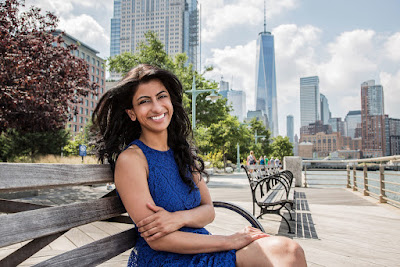After Komal Ahmad gave a homeless veteran a meal, she was inspired to do something about food waste in her community.

When she was 18, Komal Ahmad had her future figured out: “I was going to study integrative biology in college, I would fall in love while I was there, I’d get engaged one year after graduation, and then I was going to medical school.” In reality, “nothing worked according to my plan,” Ahmad, now 26, says with a laugh. “Except I did fall in love, but it wasn’t with a person. It was with an idea.”
Ahmad is the founder and CEO of Copia, which she describes as “match.com meets Uber for food recovery.” Companies use the Copia app to report when they have leftover food, what kind, and how much. When recipients such as shelters, soup kitchens, and agencies first register with Copia, they indicate how many people they need to feed, on what days, and what kind of food they’ll take. The app uses an algorithm to place the excess food, which is delivered by trained food handlers. The San Francisco–based Copia makes a profit from the fees that companies pay to remove excess food; the companies—Ahmad works with entities like the 49ers, Stanford Hospital, hotels, and catering companies—receive a tax write-off for their food donations.
How did Ahmad create Copia? As a senior at UC Berkeley, she was walking near campus one day when she saw a young man begging for food. She invited him to sit down for a meal. He told her his name was John and he had recently returned from a second tour in Iraq, but he hadn’t eaten for three days because his VA benefits hadn’t kicked in.
Ahmad had an aha moment then: While homeless people like John were starving in Berkeley, across the street the university dining halls were tossing out still-edible food. After she did some research, she says, “I realized that this was emblematic of a much larger problem.”
Nearly 50 million Americans are at risk of going hungry every day, while more than 133 billion pounds of edible food are discarded each year. Ahmad started a student group that recovered food from campus venues and distributed it to local nonprofits.
As rewarding as this was, the inefficiencies bothered her. One day, she got a call from the dining hall manager, who had 500 gourmet sandwiches left over from an event. If Ahmad wanted them, she needed to pick them up ASAP, before they spoiled. She rented a car, loaded it with the food, and called nonprofits. She found takers for only 25 sandwiches and ended up giving out the rest at a nearby park.
“I remember thinking how cool it would be if people who had food could say, ‘Hey, we have stuff,’ and people who needed it could speak up, and then we could connect the two.”
After she graduated, Ahmad worked with software developers and a tech incubator to launch Copia earlier this year. It operates in 40 cities in Northern California and has served over 700,000 people. Its biggest triumph—and challenge—to date was this past Super Bowl: Copia recovered more than 14 tons of food, which fed more than 23,000 people.
Despite her busy schedule, Ahmad tries to do one food pickup a week. “When you get to the shelter,” she says, “someone opens the door, sees all the food, and says, ‘If you hadn’t come today, 270 women wouldn’t have eaten.’ And that’s when I’m like, ‘This is why I do what I do.’”
